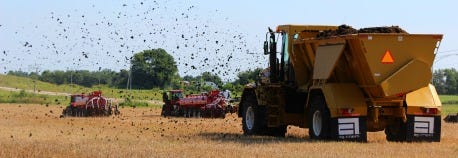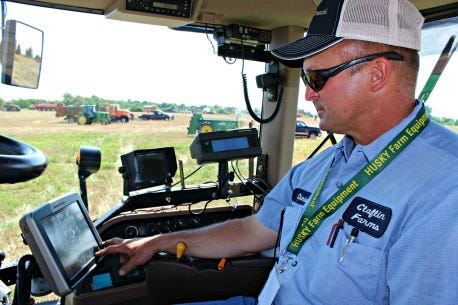
In the early 1900s, J.S. Kemp's 20th Century Manure Spreader was billed as "The Farmer's Money Maker." An advertisement appearing in newspapers during that era, highlighted the values of the first mechanical manure spreader designed and built by Joseph Kemp. It stated the spreader is "One of the best investments a farmer can make. Saves time, money, patience and increases the farmer's bank account. Increases fertility value of manure. Advances market value of every square foot of ground it runs over."

MOVING MANURE: A lot has changed since your grandfather's manure spreader. Farmers and custom applicators got in-field demonstrations of the latest in manure handling equipment during the North American Manure Expo in Springfield.
More than 100 years later, farmers like Charles Claflin are still realizing the benefits of the manure spreader. "Manure has value," he says. "And with the cost of commercial fertilizer, it made sense to spread our own cattle manure."
During the North American Manure Expo held in Springfield, industry leaders, waste haulers and farmers saw just how much manure application changed since the 1900s. Field demonstrations showcased the latest in vertical, horizontal and injection waste handling equipment.
Choosing manure handling equipment depends on the type of operation. Like many cattle and poultry producers, Claflin relies on a solid manure spreader. His Tebbe spreader can hold up to 30 cubic yards of solids and spread 1/2 ton to 4 tons per acre.
But there is a growing trend of farmers across Missouri using liquid manure handling systems to apply manure from swine and dairy facilities to cropland.
Changing manure application

SPREADING SUCCESS: Charles Claflin uses a Tebbe Solid Manure Spreader to apply cattle manure, poultry litter or lime at his farm. He uses precision technology to ensure that he is spreading just there right amount in the right location.
According to the U.S. Department of Agriculture, in 2012 there were 66 million hogs in the U.S. "If we assume every 4,000 finishing hogs produce 1 million gallon of waste per year, that would be 16.5 billion gallons of liquid waste," explains Steve Pittman, sales manager at Bazooka Farmstar, a manufacturer of hose reels. He notes that the dairy industry with its 9.2 million milk cows producing 10,000 gallons liquid waste per year would total 92.5 billion gallons of liquid waste a year. And all of that liquid waste needs to go somewhere. He says today farmers are choosing more advanced drag line systems.
Gone are the 1990s 3-pount mounted, 15-foot sweep style injection tool bars. Farmers are now using 45-foot toolbars. "This is the option some farmers now need to achieve rates and precision required to do their jobs," Pittman says.
Advantages in ownership
Claflin says the benefits of owning a spreader with fellow farmers attending the expo. No longer does manure pile up at the farm. "I am able to spread year-round within the law."
With an injection system, Pittman says there is value to the farmer in applying manure in the right place at the right time. He says farmer in Illinois farmers saw an increase of 10 to 15 bushels per acre in corn and 6 to 8 bushels in soybeans with proper manure placement. In Minnesota, farmers realized an increase of 18 bushels per acre in corn.
Pittman says that today manure is still the farmer's money maker.
About the Author(s)
You May Also Like






